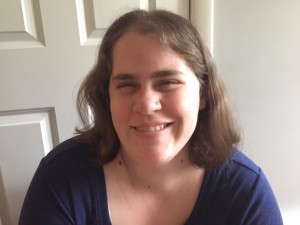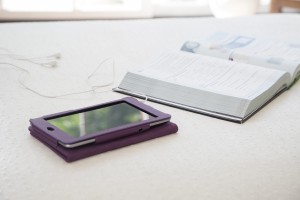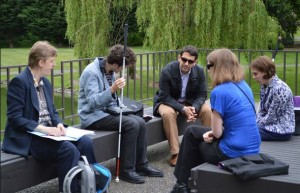By Caitlin Mongillo, Learning Ally College Success Mentor

I’m currently relaxing by the pool, enjoying a cold glass of water and a corny romance novel. However, if this was just a few years ago, I would not be experiencing such relaxation. I would have a belly filled with butterflies and a long to do list before returning to college for a new semester.
Gearing up for another four months of rigorous academics and late night paper writing sprints is always a bit daunting, but here are a few tips to remember to make the transition back to the books easier for you.
Tip 1: It’s all about the packing.
I remember vividly being ten minutes away from campus as I moved back to school my sophomore year and realizing that I forgot to buy a pillow for the upcoming semester. Sleep, as any college student will tell you, is integral for success and sanity. Shyly, I asked my parents if there was a Bed, Bath and Beyond on the way, as I was not looking forward to a semester with just a balled up sweatshirt under my head for comfort. Thankfully, we were able to stop on the way and purchase a pillow, but it was both mortifying to me that I’d forgotten something so vital and instructive, because it taught me to remember the importance of smart packing.
I have never been one to write out lists for myself, but after the pillow debacle of 2007, I realized that I needed at least a solid mental checklist before leaving each semester. Be sure to ask yourself if you have everything you need. Do you have shoes for the shower, extra towels, and enough shampoo/toothpaste? Do you have appropriate clothes for the season and any inclement weather that might occur?

From a blindness perspective, have you remembered all the cords, extra batteries, and headsets you need for the myriad of braille/talking/magnification devices you use to be successful in school? What about mobility devices; do you have an extra cane or an extra tip in case you wear one out? If you’re a guide dog user, like me, do you have an adequate supply of dog food, waste bags and toys to keep your pooch happy?
If nothing else, ask yourself if you have enough cash or money in the bank to purchase anything you realize you forgot. Frantic trips into town or unnecessary Amazon purchases aren’t the most fun, but sometimes you have no other choice. Packing can make or break a semester’s initial success, so be thorough and be organized.
Tip 2: Getting there is half the battle.
Before I started my freshman year at college, I must have visited the campus close to a dozen times. Sometimes, a guide dog trainer accompanied me, sometimes a regular O&M specialist, sometimes one of my parents (who after years of watching me use a cane/dog have become honorary COMS instructors) and sometimes any combination of the three. Their goal was, of course, to get me as familiar with my freshman class schedule as they could. When the first day of classes dawned, rainy and overcast, I suited up in my rain coat, harnessed my dog, and was ready to take on Images of Women in Literature. Even though the campus was small, I left a half hour early so that I could ensure I got a seat with enough space for my guide dog to be comfortable.
As I’d practiced a dozen times before, I found the classroom without a hitch. I took a seat and started making friendly conversation with the girl behind me. I told her I had seen the syllabus and I was surprised, and delighted, by all the novels we would read.
She told me she was surprised, since this was a Political Science class. I was so confused, and told her it was a Literature class.
She got up and read a sign that had been posted on the door aloud to me which stated that Images of Women in Literature had been moved to another classroom.
It was then that the realization dawned on me; I only knew how to get to my classes, I didn’t know how to navigate the building as a whole.
Somehow, with a lot of help from other students, professors, and staff, I located the new classroom. But, as soon as I could, I worked to learn all the buildings in their entirety, not just the little facets of them I needed for each class. You never know when a classroom can be changed, a special event hosted, or construction issues occur that might throw you off your schedule. If at all possible, work hard at the start of each semester to learn your assigned classrooms, but also to learn as much as you can about your campus as a whole. In the long term, it will help you greatly, and you won’t start off your first day like I did, feeling totally dumbstruck and helpless.
Tip 3: The Disability Student Services Office is your friend.
Some college students with disabilities utilize their DSO all the time, and some do not. This is your choice to make, and nobody can force you to utilize their services. However, it’s good to know the staff and what they can offer you

before the start of each semester. Often, DSOs can help with ordering textbooks in accessible formats, scheduling tests, and acting as a liaison between the academic staff and students. It’s good to know ahead of time what your DSO can potentially offer you, so you know if you would like to utilize their services or not.
It’s also good to reach out to their staff. If you can cultivate a good working relationship with them, your academic life will be made all the easier for it. Even if, as I chose to do, you only lean on them for specific assistance, that’s OK. It’s just good to know who is available to help and how they can help, should you choose to utilize their services. You want to be prepared at the start of each semester, and you will save yourself hours of time if you know that you don’t have to scan all your assignments independently or take tests without extra time, if those are services your DSO provides to students.
Tip 4: Be sure to pack your advocacy hat, you’ll need it.
You most likely were one of very few, if not the only, blind/VI student in your high school. It is my hope that your high school staff was supportive and that you had everything you needed to be successful in those four odd years.
However, know that when you start college there is no TVI, resource teacher or IEP to inform professors what your needs are.
This info has to come directly from you, and you can be buoyed along by DSO staff should you need assistance figuring out what those needs are. Professors may see
five hundred students in their classes each week, so you have to be vocal and advocate for your needs.
If a professor overlooks getting materials turned into an accessible format via the DSO,
remind them. If they forget to call you by name when you raise your hand,
tell them after class. You are your best self advocate, so don’t be shy. You are in the driver’s seat and can pilot yourself to success, just be sure to speak up when you need to. Professors, staff and administrators will respect you more for letting them know how you can succeed with their assistance.
As summer draws to a close, I wish you organization, sunny mobility days, cordial relationships with your college staff and a smooth transition back to school.
 Caitlin
Caitlin is a mentor in
Learning Ally's College Success Program. This is a free program funded by donors that supports blind and visually impaired college students. For more information or to join, log onto
LearningAlly.org/CollegeSuccess